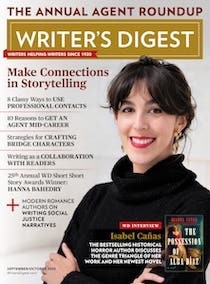Creating New Worlds
Bestselling fantasy author Terry Brooks writes about getting out to set a scene.
Fantasy writing relies heavily on a strong sense of place. Fantasy relies on imaginary worlds populated by alien races and creatures, and distinguished by strange, often unfamiliar, languages, cultures and beliefs. Even if the characters and their problems are familiar, their surroundings and the nature of their lives usually aren’t. For readers to become invested in the characters and story, they must first form a strong bond with the world the characters inhabit. A writer needs to present this world as a fully realized experience where all five senses are engaged. This doesn’t just happen with a few lines. It happens because a writer fully renders the world in 3-D detail.
Now a writer can do that without going anywhere, simply by employing imagination. What’s missing is the element of surprise—not necessarily for the reader, but for the writer. Writers mostly know the landscapes of their own minds. Unfortunately, familiar territory isn’t a fertile breeding ground for surprise. Traveling, though, takes you to new places, and new places almost always offer surprises.
Ten years ago, my wife, Judine, and I took a trip into Canada, traveling the Icefields Parkway from Banff north to Jasper. Our plan was to see as many of the mountains, glaciers and parks as we could squeeze in. Mount Edith Cavell was supposed to be spectacular—an impressive glacier and ice melt lake. So off we went, driving into the wilderness. We were dismayed when we reached the trailhead—an unimpressive gravel space sitting in the middle of some ratty trees.
The hike in lasted much longer than my interest in what was waiting. Then, just as I was about to suggest we turn back, we crested a barren, rocky rise and in front of us, visible for the first time, was one of the most amazing vistas I’ve ever seen. A glacier cradled between two peaks. At the head of an azure-blue ice melt lake, huge blocks of ice floated like monoliths. Gaping ice caves opened into darkened interiors. We stood there in silence as the glacier began to calve with loud, sharp cracks, and shards of ice spilled toward the lake.
Now, I could have stayed home and found a picture of Mount Edith Cavell and the glacier, and maybe even the ice melt lake and caves. But what I would have missed. The intense silence. The sense of space and size. The solitude in the presence of something so much older and more durable. The sound of glacier ice cracking and falling into the lake. The enormity of the moment.
Perhaps more importantly, I would have missed that moment of complete surprise at discovering the unexpected. I would have failed to experience the sudden rush of adrenalin that had me scrambling for my notebook. I would have lost all that, and with it the impetus for the flow of fresh ideas that would lead to a new book.
While traveling I’ve made many discoveries that have served as rocket fuel for journeys into new storytelling places. None of those journeys would have happened if I hadn’t traveled to find them. Sense of place, of the energy found in a new discovery, has to be experienced firsthand.
There’s an old phrase: “Words can’t begin to describe (fill in the blank).” Well, if you’re a fiction writer, they not only can—they must.



